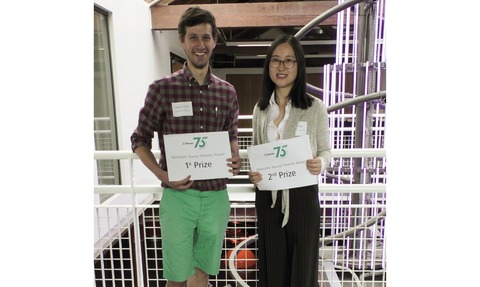
Metrohm UK and Ireland is delighted to announce the winners of its Young Chemist Awards, held in the company’s 75th year.
As part of the company’s anniversary celebrations, young chemists were invited to submit their research in a competition to Metrohm’s appreciation of the contribution they are making towards scientific development.
A team of experts were hard-pressed to narrow down the entries submitted from the UK and Ireland, with the winners announced at the company’s networking event at the Museum of Science and Industry, Manchester, earlier this month.
First place went to Alastair Lennox, from the University of Bristol for his research project entitled ‘Electrochemical Alpha-Cyanation of Secondary Piperidines’. He said: “My research is in the field of organic electrochemistry, which is currently becoming a very popular tool for organic synthesis.
By using an anode or cathode, traditional redox reagents, which are often toxic or produce a lot of waste, can be replaced. Therefore, it is a much more sustainable way to do organic reactions. In this work, I have optimised a reaction that cyanates simple secondary amine compounds with high selectivity and good functional group tolerance. The results should have broad implications for the sustainable manufacture of complex organic molecules, including new drug and agrochemical compounds.”
Alastair did his undergraduate studies in at the University of Manchester and PhD studies in Bristol, with a short period in the US, and is now currently back in Bristol.
Second place went to Hang Xiang from Newcastle University for her project entitled ‘Enhanced electrochemical production of carbonaceous products from CO2 in aqueous electrolytes’. Hang started her PhD research in 2015 at Newcastle University after obtaining both Bachelor and Masters degrees in Chemical Engineering in China.
Her PhD project focuses on “Electrochemical CO2 conversion into chemicals and fuels,” which is funded by SAgE Doctoral Training Award and Overseas Research Scholarship from Newcastle University.
She said: “Carbon dioxide (CO2) is the chief culprit of global warming. Electrochemical reduction (ER) is one of the most economical ways to utilize this most abundant and cheapest carbon source. This process only use electricity and water, as inputs to produce higher-energy carbon-based products and a co-product of pure oxygen.
Within two years’ study, I’ve successfully built up an advanced reactor by 3D printing technology which removed CO2 mass transfer limitation and largely improved the reaction rate. With our development on electro-catalysts, C1 (either CO or formate) could be produced with >90% selectivity in high yield, which is promising for large-scale production and shows a potential for commercialisation.”
Metrohm would like to congratulate both Alastair and Hang and wish them every success with their research in the future.
You can also see the winners on Metrohm's website here.




